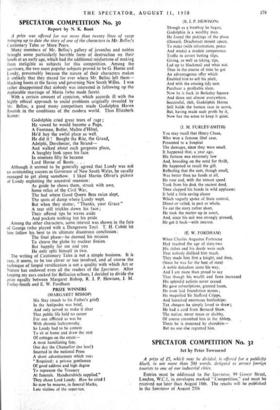SPECTATOR COMPETITION No. 30
Report by N. IC. Boot
A prize was offered for not more than twenty lines of verse bringing up to date the story of one of the characters in Mr. &noes Cautionary Tales or More Peers.
Many members of Mr. Belloc's gallery of juveniles and nobles brought some particularly horrible form of destruction on their heads at an early age, 'which had the additional misfortune of making them ineligible as subjects for this competition. Among the survivors, the two most popular subjects proved to be G. Home and Lundy, presumably because the nature of their characters makes it unlikely that they stayed for ever where Mr. Belloc left them— blacking boots at the Savoy and governing New South Wiles. I was rather disappointed that nobody was interested in following up the deplorable marriage of Maria (who made faces).
With a certain amount of cynicism, which accords ill with the highly ethical approach to social problems originally revealed by Mr. Belloc, a good many competitors made Godolphin Home flourish in the conditions of the modern world. Thus Elizabeth Kemp: Godolphin cried great tears of rage ; He vowed he would become a Page, A Footman, Butler, Maitre d'Hatel, He'd buy the awful place as well.
He did it ! Bought the Ritz, the Grand, Adelphi, Dorchester, the Strand— And walked about each gorgeous place, A haughty look upon his face.
In nineteen fifty he became Lord Home of Boote. . . .
Although it seemed to be generally agreed that Lundy was not an outstanding success as Governor of New South Wales, he usually managed to get along somehow. I liked Martin Oliver's picture of Lundy exploiting the ancestral mansion : As guide he shows them, struck with awe, Some relics of the Civil War, The bed where Good Queen Bess twice slept, The spots of damp where Lundy wept. But when they stutter, " Thanks, your Grace" A tear still trickles down his face ; Their offered tips he waves aside And pockets nothing but his pride. Among the other characters, some interest was shown in the fate of George (who played with a Dangerous Toy). T. H. Cubitt let him follow his bent to its ultimate disastrous conclusion: The final phase—he deemed his mission To cleave the globe by nuclear fission.
But happily for me and you He only split himself in two. The writing of Cautionary Tales is not a simple business. It is easy, it seems, to be too clever or too involved, and of course the technique -of limpid versification is not a quality with which Art or Nature has endowed even all the readers of the Spectator. After keeping my ears cocked for Bellocian echoes, I decided to divide the prize equally between Margaret Bishop, R. J. P. Hewison, J. M. Furley-Smith and E. W. Fordham
PRIZE WINNERS (MARGARET BISHOP)
His Stay (much to his Father's grief) In the Antipodes was brief, And only served to make it clear That public life held no career For one afflicted as was he With chronic lachrymosity.
So Lundy had to be content To sit at home and draw the rent
Of cottages on the estate—
A most humiliating fate• One day the Chancellor (no less!)
Inserted in the national Press A short advertisement which ran:
" Required: a private gentleman Of good address and high degree To represent the Treasury At funerals. Handkerchiefs supplied."
They chose Lord Lundy. How he cried 1.
So now he mourns, in funeral blacks, Late victims of the super-tax.
Though as a bootboy he began, Godolphin is a wealthy man. He found the pickings of the place (Denarii, Drachmae) mount apace, To make (with information, pence And winks) a modest competence. Traffic in covert betting slips, Giving, as well as taking, tips, Led up to blackmail and what not. Thus in the course of time he got An advantageous offer which Enabled him to sell his pitch, And with the ensuing tidy sum Purchase a profitable slum.
Now he is back in Berkeley Square And dines out almost everywhere. Successful, rich, Godolphin Horne Still holds the human race in scorn, But, having made such profit by it, Now has the sense to keep it quiet.
(J. M. FURLEY-SMITH)
You may recall that Henry Chase, Who won a famous libel case, Presented to a hospital The damages, since they were small. It happened that, a year ago, His fortune was extremely low And, brooding on the need for thrift, He happened to recall the gift. Reflecting that the sum, though small, Was better than no funds at all, He rose and, with the utmost speed Took from his desk the ancient deed, Then clapped his hands in wild applause: It held a little saving clause Which vaguely spoke of State control, Direct or veiled, in part or whole. To cut the story rather short, He took the matter up in court, And, since his suit was strongly pressed, He got it back—with interest.
(E. W. FORDHAM) When Charles Augustus Fortescue Had reached the age of sixty-two His riches and his deeds were such That nobody disliked him much.
They made him first a knight, and then,
(Since he was far the best of men) A noble dukedom came his way, And I am more than proud to say That though his wealth and fame increased His splendid actions never ceased.
He gave subscriptions, granted loans, He even laid foundation stones ; He magnified Sir Stafford Cripps, And launched enormous battleships:
Tax cheques he simply loved to draw;
He had a card from Bernard Shaw.
The nation, never mean or shabby, Of course entombed him in the Abbey.
There he is mourned by cherubim—
But no one else regretted him.


































 Previous page
Previous page